 Petzlover
Petzlover Both Rottweiler and Standard Poodle are originated from Germany. Rottweiler may grow 29 cm / 12 inches higher than Standard Poodle. Rottweiler may weigh 33 kg / 73 pounds more than Standard Poodle. Rottweiler may live 4 years less than Standard Poodle. Rottweiler may have more litter size than Standard Poodle. Rottweiler requires Low Maintenance. But Standard Poodle requires Moderate Maintenance
Both Rottweiler and Standard Poodle are originated from Germany. Rottweiler may grow 29 cm / 12 inches higher than Standard Poodle. Rottweiler may weigh 33 kg / 73 pounds more than Standard Poodle. Rottweiler may live 4 years less than Standard Poodle. Rottweiler may have more litter size than Standard Poodle. Rottweiler requires Low Maintenance. But Standard Poodle requires Moderate Maintenance
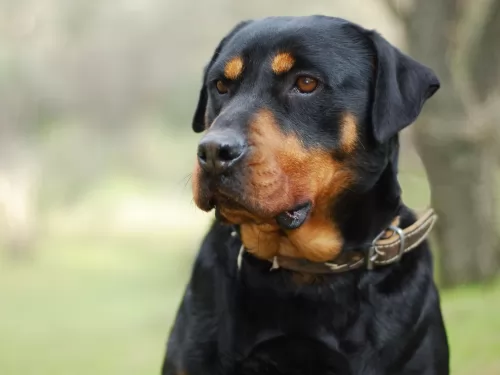 It is beleived to be the Rottweiler has been developed from the Roman cattle dogs. The Roman empire made a camp in a place at Germany in 74 AD. The area was called as 'das Rote Wil' and later as 'Rottweil'. In the middle ages Rottweiler was used in bear hunting and as a cattle dog. In 1899 the International club for Leonbergers and Rottweiler dogs was formed in Germany. In 19th century due to set in of railways the cattle was moved by railways and the need for the breed declined. When the world war was set in there came a heavy demand for police dogs. Rottweilers played a major role in first and second world war.
It is beleived to be the Rottweiler has been developed from the Roman cattle dogs. The Roman empire made a camp in a place at Germany in 74 AD. The area was called as 'das Rote Wil' and later as 'Rottweil'. In the middle ages Rottweiler was used in bear hunting and as a cattle dog. In 1899 the International club for Leonbergers and Rottweiler dogs was formed in Germany. In 19th century due to set in of railways the cattle was moved by railways and the need for the breed declined. When the world war was set in there came a heavy demand for police dogs. Rottweilers played a major role in first and second world war.
In 1921 many German Rottweiler clubs joined together to form ADRK, which is Allgemeiner Deutscher Rottweiler Klub. This is said to be the home club of Rottweiler. American kennel club recognised them in 1931. They become 9th most popular breed in America in 2013.
 The Poodle is the national dog of France, and there they are known as the duck dog. The breed actually originated as a duck hunter in Germany. It was known as ‘Pudelin’ which means splashing in water.
The Poodle is the national dog of France, and there they are known as the duck dog. The breed actually originated as a duck hunter in Germany. It was known as ‘Pudelin’ which means splashing in water.
The dog has always had a crisp, curly coat to protect it from the elements. It is classified as a non-sporting dog. Soon the French became aware of what a fine dog it was and it became sought after among the elite in France.
It has been known for at least 400 years. While it is still not sure precisely from which country it comes, the poodle is a descendant of the French Water Dog which is now extinct.
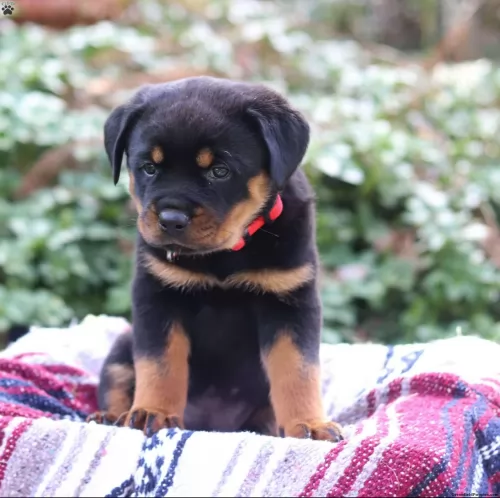 Rottweilers are good natured, obedient and are very much eager to work. They are calm, confident and an excellent watchdog. They will not make friends immediately. Rottweilers can be said as an all purpose dog since they are suitable as companion and watch dog as well. He is good in herding and guarding as genital feature. Rottweiler must be trained from its younger stage and should not be hit while training. They have high energy level and thus they are interested in doing work if properly trained. There are more possibilities of biting the strangers because of watchdog tendency.
Rottweilers are good natured, obedient and are very much eager to work. They are calm, confident and an excellent watchdog. They will not make friends immediately. Rottweilers can be said as an all purpose dog since they are suitable as companion and watch dog as well. He is good in herding and guarding as genital feature. Rottweiler must be trained from its younger stage and should not be hit while training. They have high energy level and thus they are interested in doing work if properly trained. There are more possibilities of biting the strangers because of watchdog tendency.
They are very good in herding sheeps as they have a natural gathering style. They are clever and adjusts the barking sound according to the situation. While herding they used to prove the leadership by selecting the dominant one in the flock and challenging it. If they were made to watch a same flock of cattle regularly, then they will develop a bond with them and will be affectionate with them as long as the cattle obeys its commands.
 The Standard Poodle is a medium-sized dog that stands between 35 and 40cm in height and weighs between 20 - 27 kg. The coat of the standard poodle is curly and medium length and it comes in a range of different colors – black, brown, cream, apricot or white.
The Standard Poodle is a medium-sized dog that stands between 35 and 40cm in height and weighs between 20 - 27 kg. The coat of the standard poodle is curly and medium length and it comes in a range of different colors – black, brown, cream, apricot or white.
The ears are medium shaped and floppy and the tail is most times docked to half its length. The muzzle is fairly long and the eyes are brown and alert.
Standard Poodles are full of the joys of living and they are friendly, fun, playful dogs. They love playing games with the children and they make excellent family dogs.
He is quite feisty and stubborn and will require training and socialization. He is smart and is in fact, one of the most trainable of all the dog breeds.
They can adapt to life in the city or the countryside but he will need to be exercised wherever he is. The Standard Poodle isn’t aggressive but he can still make a good watchdog.
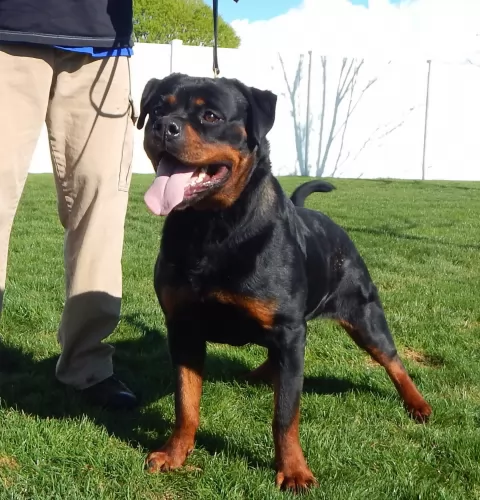 They are friendly with children and enjoy the company with them. But it is not advised to leave them with children without adult supervision.
They are friendly with children and enjoy the company with them. But it is not advised to leave them with children without adult supervision.
Rottweilers do not make friends immediately but take time to know about new people. He is an excellent watchdog. Males are quiet in nature but are watchful and females are more affectionate and obey some more. A good training is required for them to obey your orders.
They are not good for apartment life and thus a fenced back yard will be better for them to play and spend the energy. They require companion and will be happy to walk around with you. Hot weather will be some what better for them when compared with cold.
Rottweilers are easy to train because of their high intelligence. The training should be started in their young stage to have best results. They should not be dominated but treated kindly with understanding. They should be comfortable with the surroundings and people. Giving him a reward for training will make him interested in doing it. If he does a mistake then he should not be hit, so that he may get fear and loss his interest in doing it. Punishments will never work for them but rewarding will make him encouraged. Simple commands such as sit and stand shall be taught to them.
 Poodles are clever, easy to train and capable of living well in the city or in the countryside.
Poodles are clever, easy to train and capable of living well in the city or in the countryside.
They’re adaptable dogs too which makes them excellent family pets. They’re active and social so when you bring one into your home, you’re going to know he is there.
He wants to be involved in every aspect of your life, bonding with all members of the family, loving to spend time with each one.
He is an all-rounder and will also be a great watchdog. Loving and loyal, the Standard Poodle is ready to become your ideal pet and companion.
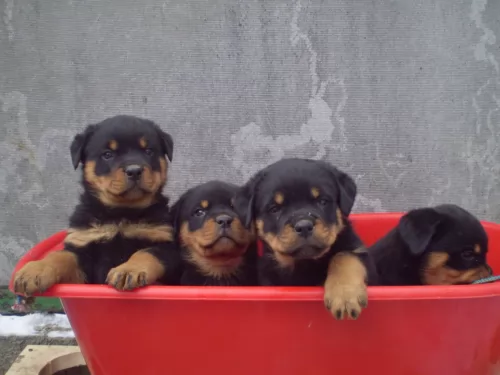 The health issues affecting the eyes of them are Cataract and Progressive Retinal Atropy. Health problems common in their joints are Hip Dysplasia, Elbow Dysplasia and Panosteitis. They also have chances to get circulatory system problems like Aortic Stenosis and Von Willebrand's Disease. Other common health problems in Rottweiler are Bloat and Cancer.
The health issues affecting the eyes of them are Cataract and Progressive Retinal Atropy. Health problems common in their joints are Hip Dysplasia, Elbow Dysplasia and Panosteitis. They also have chances to get circulatory system problems like Aortic Stenosis and Von Willebrand's Disease. Other common health problems in Rottweiler are Bloat and Cancer.
Mostly people think that Rottweilers don't shed but they are short haired dog and sheds more. They are having double coat that is undercoat and topcoat. The undercoat is softer and protects them in winter and topcoat is rougher and visible. It is said that they will shed in spring and winter seasons. Shedding can be reduced by brushing them.
 The Standard Poodle doesn’t have many health issues to worry about and he can live to a ripe old age of 15 or so if he is looked after well.
The Standard Poodle doesn’t have many health issues to worry about and he can live to a ripe old age of 15 or so if he is looked after well.
However, he can succumb to some of the common dog diseases there are – eye problems, skin allergies, bloat and ear infections.
Allergies in dogs can be caused by pollen, insects, food, and medicines. These allergies can all cause terrible itching, scratching, watery eyes, skin inflammation, and pain.
The ears, underarms, groin and around the eyes are often affected. It can make your pet most miserable. Your dog will have to get to the vet to relieve him of his discomfort and the vet will want a medical history to find out what is causing the problem.
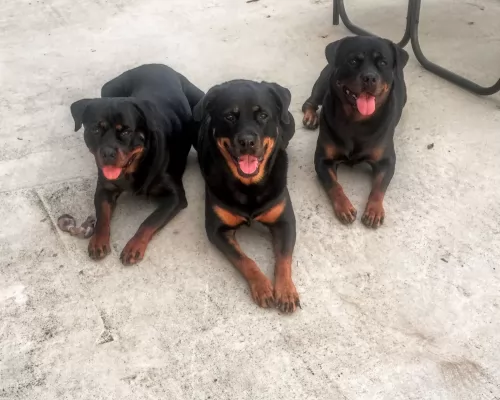 Rottweiler puppies should be given a diet which has protein, carbohydrates and fats. They need different diets in their growing stages. They can be given chicken with bones and vegetables for 4 days in a week. Beef with vegetables can also be given. When feeding them red meat a raw meaty bone can also be included. Fish oil can be given such that starting with 1000 mg and making it to 3000 mg in a time of two weeks.
Rottweiler puppies should be given a diet which has protein, carbohydrates and fats. They need different diets in their growing stages. They can be given chicken with bones and vegetables for 4 days in a week. Beef with vegetables can also be given. When feeding them red meat a raw meaty bone can also be included. Fish oil can be given such that starting with 1000 mg and making it to 3000 mg in a time of two weeks.
High calories of protein should be provided to them to meet their energy requirements. While buying commercial food it should be checked for the main ingredient to be meat. Protein levels should be more from animals than vegetables. High quality dairy products should be included. Food should not have low quality flavours and preservatives. Healthy fat is necessary for their skin and coat. If these fats are not provided it will cause dandruff and itchy skin.
Brushing them weekly once is recommended for their coat and skin. Buying the puppy from reputable breeder will be better. Vaccinations and preventive medicines should be given on right time. Spaying and Neutering should be done to avoid unwanted pregnancy. High quality diet should be maintained. Making them to bath once in a week is advisable. Nails should be trimmed once in every two weeks.
Rottweilers like to chase something and Laser pointer will be a good game for them. It will make them busy and also entertain us. But it should be on a limit and they should not get bored. A treat or toy can be hided and they can be made to find it. A bottle should be filled with water and frozen. The frozen bottle can be given to them for playing. In summer time it will make them very happy to play with it. A ball or toy can be thrown and they can be made to fetch it. Walking them is also a good exercise.
 The Standard Poodle will require regular brushing even though it is a low- or non-shedding breed. The curls can become matted. Some poodle owners choose to have their poodles professionally groomed and clipped.
The Standard Poodle will require regular brushing even though it is a low- or non-shedding breed. The curls can become matted. Some poodle owners choose to have their poodles professionally groomed and clipped.
The nails will need to be trimmed.
The teeth will also need to be checked if the dog will allow you to look inside his mouth. A bad, oozing tooth can cause all kinds of medical problems.
Because of the floppy ears, check inside the ears for dirt and wax buildup and signs of redness and a possible ear infection. If you don’t like to probe inside your dog’s ears or mouth, professional dog groomers will do this for you.
Your poodle is an active dog and he will need regular daily exercise. Chase him on the lawn, throw a ball for him, hide away from him and let him find you. He will also love daily walks.
Just like with any other dog, your Standard Poodle needs good, nutritional food to remain healthy. Some of the commercially manufactured dog foods you get are bad for a dog as they don’t have natural ingredients and are devoid of vitamins and minerals.
They’re certainly a convenient way to feed a dog, but try and go for the ones that are wholesome for your pet.
Home-made food such as boiled chicken, brown rice and vegetables is a good choice as it is healthy and won’t cause your dog to battle with digestive problems. Avoid spicy, exotic foods and things such as popcorn, onion, peanuts, and chocolate.
Make sure your Standard Poodle always has a bowl of fresh, cool water available.